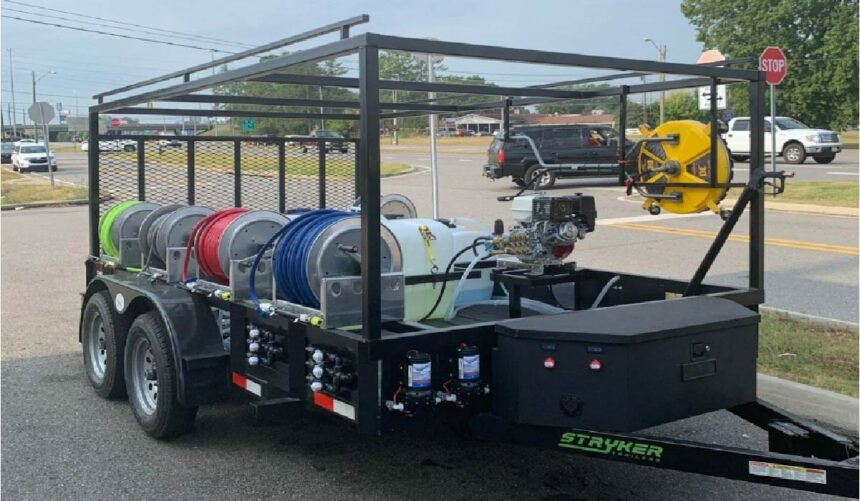In the world of exterior cleaning, the right tools and techniques are essential for achieving spotless results. While high-powered equipment like Soft Wash Skids and pressure washers play a crucial role, it’s the pressure washing chemicals that often make the real difference. These specialized solutions are designed to target stains, mold, algae, mildew, and grime at a molecular level, ensuring surfaces are not only cleaned but also protected. Understanding the science behind these chemicals is vital for contractors and homeowners alike, as it helps maximize efficiency and safety in every cleaning project.
Why Pressure Washing Chemicals Are Essential
Simply blasting surfaces with water might remove dirt on the surface, but it’s rarely enough to fully clean and sanitize. For example, mold and mildew spores can remain embedded in wood or concrete, quickly regrowing after a wash. This is where pressure washing chemicals step in. Formulated with detergents, surfactants, and biocides, these solutions break down organic matter, kill harmful growths, and lift contaminants from deep within surfaces.
The science is simple: water pressure alone removes what you can see, but chemicals eliminate what you can’t—leading to longer-lasting results.
The Chemistry at Work
Pressure washing chemicals are carefully designed to interact with different materials and stains. Here are some common types and how they work:
- Surfactants: These reduce surface tension, allowing water to penetrate and lift grease, oil, and dirt more effectively.
- Oxidizers: Commonly found in bleach-based solutions, oxidizers attack organic matter at a cellular level, killing mold and algae.
- Acidic Cleaners: Used for minerals and rust stains, acids dissolve hard deposits on concrete and brick.
- Neutralizers: After acidic or alkaline washes, neutralizers restore pH balance to protect surfaces.
By combining these chemical actions with the right application methods, contractors can clean more effectively than with water alone.
Pressure Washing Chemicals for Different Surfaces
Not all surfaces are created equal, which is why understanding the right chemical to use is critical.
- Concrete and Hard Surfaces
Concrete is porous and absorbs stains easily. Degreasers and alkaline-based cleaners break down oil, while acidic solutions help tackle rust and mineral deposits. - Wood Surfaces
For decks and fences, wood cleaning chemicals are formulated to gently lift dirt without damaging fibers. Oxygenated cleaners are a popular choice because they clean effectively while being eco-friendly. - Roofs and Siding
Here’s where Soft Wash Skids shine. Using low pressure and specialized solutions, contractors can safely remove algae and mildew from shingles or siding without risk of structural damage. - Brick and Stone
Muriatic acid and other acidic solutions are often used for removing efflorescence and other mineral-based stains. Proper dilution is essential to avoid damage.
The Role of Soft Wash Skids in Chemical Application
While chemicals are powerful, how they are applied matters just as much. Traditional high-pressure washing can damage delicate surfaces like shingles or painted siding. Soft Wash Skids solve this problem by combining low-pressure water delivery with effective chemical application.
With a soft wash system, chemicals do most of the work, while water rinses everything away. This method ensures surfaces are preserved while still achieving a deep clean. It’s a safer and more professional approach that many modern contractors prefer over high-pressure methods for certain jobs.
Balancing Effectiveness with Safety
While pressure washing chemicals are highly effective, they must be used responsibly. Overuse or improper dilution can harm plants, pets, and even the surfaces being cleaned. Contractors need to follow manufacturer guidelines carefully and invest in proper training.
Additionally, advancements in eco-friendly solutions are making it easier to balance performance with environmental responsibility. Biodegradable surfactants and non-toxic cleaners are gaining popularity as they provide excellent results without leaving harmful residues.
Why Contractors Should Master Chemical Knowledge
For cleaning professionals, understanding the science of chemicals isn’t just about delivering better results—it’s also a way to stand out from the competition. Clients trust contractors who know how to treat surfaces safely and effectively. A contractor skilled in using Soft Wash Skids with the right blend of chemicals can clean faster, protect surfaces, and leave a longer-lasting impression.
Moreover, knowing which solutions to use reduces wasted effort, increases efficiency, and improves profitability. For example, using a targeted chemical for rust stains is much more efficient than repeatedly blasting with high-pressure water.
Conclusion
Pressure washing is as much about science as it is about equipment. While powerful washers and Soft Wash Skids provide the means to apply water and solutions, it’s the pressure washing chemicals that determine the overall effectiveness of the job. By understanding how these solutions work, choosing the right ones for each surface, and applying them responsibly, contractors can elevate their services to new levels of professionalism.
The takeaway is clear: if you want long-lasting, safe, and efficient cleaning results, the right pressure washing chemicals are non-negotiable. When paired with modern tools like soft wash systems, they ensure surfaces are restored beautifully—without damage.









